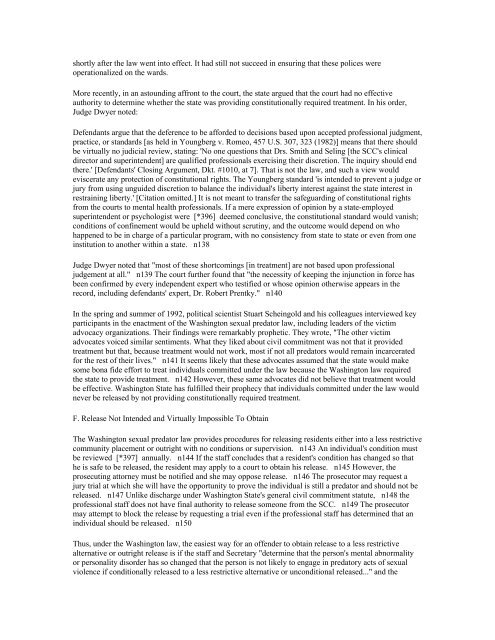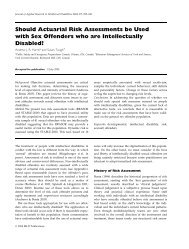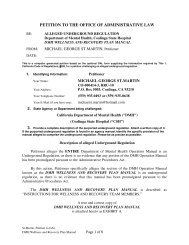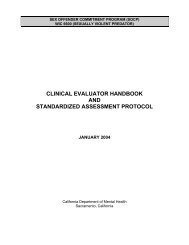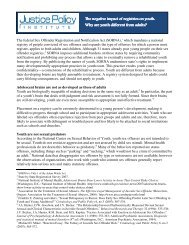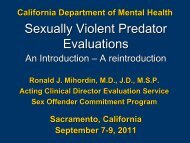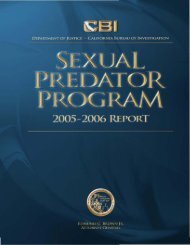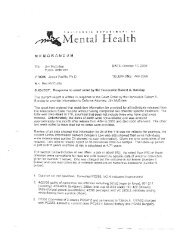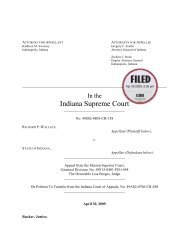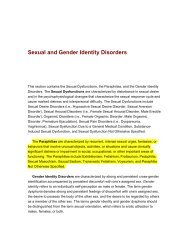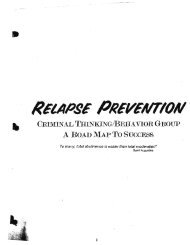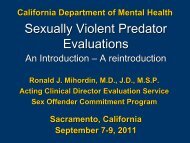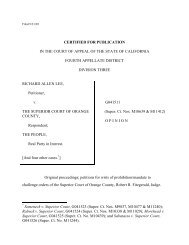effect, the sexual predator mental health program did not have any of the oversight or quality controlmechanisms customarily found in other state mental health programs. n126 The Special Master outlinedthe following mechanisms:Established mental health programs, particularly those in institutions, have in place a number ofmechanisms to monitor the services provided and ensure their quality of care. These include internalmechanisms, such as a quality assurance or improvement system, as well as procedures <strong>for</strong> ensuring thatpatients' rights are [*394] protected. External oversight is also a standard part of established mental healthprograms, through licensure, accreditation, or other program reviews that are conducted by independentprofessionals. Finally, provisions to ensure that programs remained connected to the community at large, aswell as to constituent, academic and related service organizations are usually in place. n127This is very strong evidence that Washington state simply did not care whether quality mental health carewas being provided at the SCC. n128In her most recent reports, numbers Thirteen and Fourteen, the Special Master concluded that, though theSCC has made some improvements, significant deficiencies still exist in the SCC treatment program. Theseinclude a need <strong>for</strong> more advanced staff training in sexual deviance, better documentation of treatment plans<strong>for</strong> the residents, clear assessment of each resident's progress in therapy, and clear criteria on what eachresident must accomplish to be released, a complete community release program to allow the eventualrelease of residents into the community and to be finally released from the SCC, and a need <strong>for</strong> familycounseling <strong>for</strong> relatives. n129In a recent court hearing held to determine whether the injunction under which the SCC has operated <strong>for</strong>the last four years should be released, the special master testified that "psychological treatment at the state'scenter <strong>for</strong> sex predators still doesn't pass muster and is inappropriately housed in a grim prisonenvironment...." n130 She also concluded that there was "a lack of educational opportunities andmeaningful work and social options at the center." n131 Once again, she recommended that the court notlift the injunction because the SCC, though having good policies, has not put them into practice. n132 Todate, over eight years after the law was enacted and four years after the initial injunction was issuedordering Washington state to provide constitutionally adequate treatment, Washington has not fullycomplied with the judge's orders.On October 1, 1997, Judge Dwyer found that "the central need is to translate into reality a program thatexists on paper. What is required is not just a plan but a reality-the genuine providing of adequate mentalhealth treatment to all [*395] SCC residents willing to accept it." n133 Apparently, the SCCadministration had spent a great deal of its time and energy preparing written documents that are essential<strong>for</strong> implementing an institutional treatment program, such as comprehensive treatment plans and treatmentdata base. n134 In addition, the administration prepared and adopted a policy <strong>for</strong> community reentry.n135Judge Dwyer, relying on the Special Master's reports, concluded that the SCC needed to have a "fullyoperational program." n136 He described the elements necessary <strong>for</strong> such a program:that staff members understand the treatment model and their roles within it; that the delivery of services beeffective and consistent across treatment teams; that residents know what they must do to move towardrelease and where they are in the treatment process; that there be ongoing monitoring of the treatmentprocess; that the residents know the program policies; that policy en<strong>for</strong>cement be consistent; that theresidents be treated with respect; and the program be able to deal with the long-term needs of those notengaged in treatment. n137In sum, it appears that, almost seven years after the statute was implemented, the administration spent mostof its energy developing the written policies and supporting documentation that should have been in place
shortly after the law went into effect. It had still not succeed in ensuring that these polices wereoperationalized on the wards.More recently, in an astounding affront to the court, the state argued that the court had no effectiveauthority to determine whether the state was providing constitutionally required treatment. In his order,Judge Dwyer noted:Defendants argue that the deference to be af<strong>for</strong>ded to decisions based upon accepted professional judgment,practice, or standards [as held in Youngberg v. Romeo, 457 U.S. 307, 323 (1982)] means that there shouldbe virtually no judicial review, stating: 'No one questions that Drs. Smith and Seling [the SCC's clinicaldirector and superintendent] are qualified professionals exercising their discretion. The inquiry should endthere.' [Defendants' Closing Argument, Dkt. #1010, at 7]. That is not the law, and such a view wouldeviscerate any protection of constitutional rights. The Youngberg standard 'is intended to prevent a judge orjury from using unguided discretion to balance the individual's liberty interest against the state interest inrestraining liberty.' [Citation omitted.] It is not meant to transfer the safeguarding of constitutional rightsfrom the courts to mental health professionals. If a mere expression of opinion by a state-employedsuperintendent or psychologist were [*396] deemed conclusive, the constitutional standard would vanish;conditions of confinement would be upheld without scrutiny, and the outcome would depend on whohappened to be in charge of a particular program, with no consistency from state to state or even from oneinstitution to another within a state. n138Judge Dwyer noted that "most of these shortcomings [in treatment] are not based upon professionaljudgement at all." n139 The court further found that "the necessity of keeping the injunction in <strong>for</strong>ce hasbeen confirmed by every independent expert who testified or whose opinion otherwise appears in therecord, including defendants' expert, Dr. Robert Prentky." n140In the spring and summer of 1992, political scientist Stuart Scheingold and his colleagues interviewed keyparticipants in the enactment of the Washington sexual predator law, including leaders of the victimadvocacy organizations. Their findings were remarkably prophetic. They wrote, "The other victimadvocates voiced similar sentiments. What they liked about civil commitment was not that it providedtreatment but that, because treatment would not work, most if not all predators would remain incarcerated<strong>for</strong> the rest of their lives." n141 It seems likely that these advocates assumed that the state would makesome bona fide ef<strong>for</strong>t to treat individuals committed under the law because the Washington law requiredthe state to provide treatment. n142 However, these same advocates did not believe that treatment wouldbe effective. Washington State has fulfilled their prophecy that individuals committed under the law wouldnever be released by not providing constitutionally required treatment.F. Release Not Intended and Virtually Impossible To ObtainThe Washington sexual predator law provides procedures <strong>for</strong> releasing residents either into a less restrictivecommunity placement or outright with no conditions or supervision. n143 An individual's condition mustbe reviewed [*397] annually. n144 If the staff concludes that a resident's condition has changed so thathe is safe to be released, the resident may apply to a court to obtain his release. n145 However, theprosecuting attorney must be notified and she may oppose release. n146 The prosecutor may request ajury trial at which she will have the opportunity to prove the individual is still a predator and should not bereleased. n147 Unlike discharge under Washington State's general civil commitment statute, n148 theprofessional staff does not have final authority to release someone from the SCC. n149 The prosecutormay attempt to block the release by requesting a trial even if the professional staff has determined that anindividual should be released. n150Thus, under the Washington law, the easiest way <strong>for</strong> an offender to obtain release to a less restrictivealternative or outright release is if the staff and Secretary "determine that the person's mental abnormalityor personality disorder has so changed that the person is not likely to engage in predatory acts of sexualviolence if conditionally released to a less restrictive alternative or unconditional released..." and the
- Page 3 and 4: This Article will demonstrate that
- Page 5 and 6: In its findings, which were enacted
- Page 7 and 8: esidents cannot use the SCC grievan
- Page 9: In her reports, the special master
- Page 13 and 14: The Kansas experience confirms that
- Page 15 and 16: There is minimal trust between staf
- Page 17 and 18: For example, to satisfy its concern
- Page 19 and 20: TJ must develop a normative philoso
- Page 21 and 22: n6 David B. Wexler, New Directions
- Page 23 and 24: n34 See, e.g., Wash. Rev. Code § 7
- Page 25 and 26: n58 See DSM-IV, supra note 30, at 6
- Page 27 and 28: n82 See Thirteenth Report of the Sp
- Page 29 and 30: n110 Eleventh Report of the Special
- Page 31 and 32: commitment. See Wash. Rev. Code Ann
- Page 33 and 34: n171 See, e.g., Briefs of the State
- Page 35 and 36: and the bond formed between them. T
- Page 37 and 38: in predatory acts of violence if no
- Page 39 and 40: deprives one charged with a crime o
- Page 41 and 42: Time of Request: Wednesday, July 04


